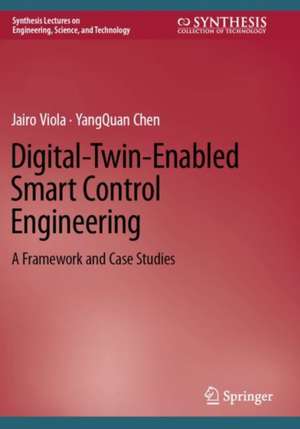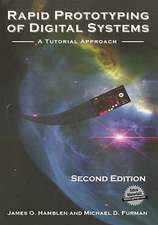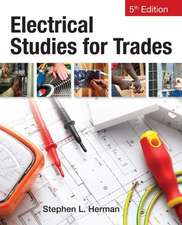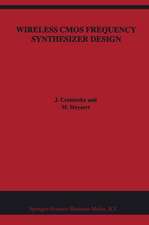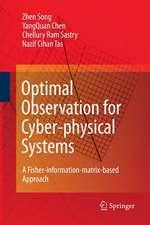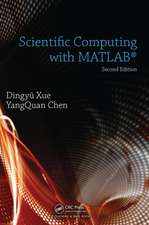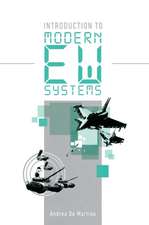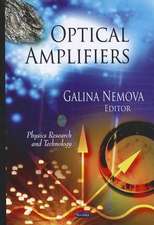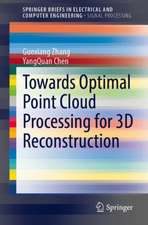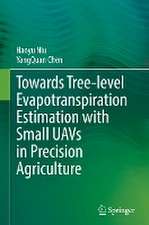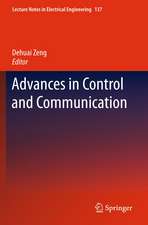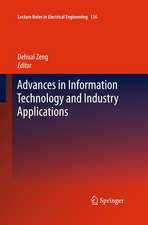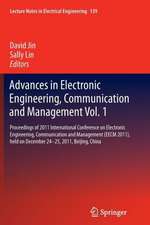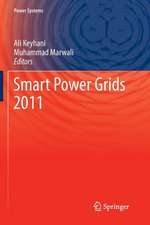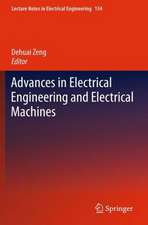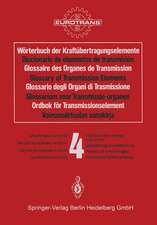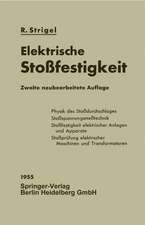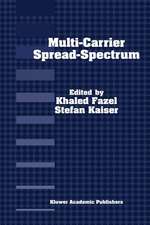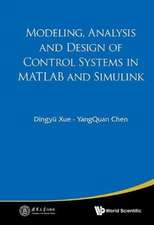Digital-Twin-Enabled Smart Control Engineering: A Framework and Case Studies: Synthesis Lectures on Engineering, Science, and Technology
Autor Jairo Viola, YangQuan Chenen Limba Engleză Paperback – 14 mar 2024
This book presents a novel design framework for the development of Digital Twin (DT) models for process- and motion-control applications. It is based on system-data acquisition using cutting-edge computing technologies, modelling of physical-system behavior through detailed simultaneous simulation of different aspects of the system, and optimal dynamic behavior-matching of the process. The design framework is enhanced with real-time data analytics to improve the performance of the DT’s behavior-matching with the real system or physical twin.
The methods of creating a DT detailed in Digital-Twin-Enabled Smart Control Engineering make possible the study of a system for real-time controller tuning and fault detection. They also facilitate life-cycle analysis for multiple critical and dangerous conditions that cannot be explored in the corresponding real system or physical twin. The authors show how a DT can be exploited to enable self-optimizing capabilitiesin feedback control systems.
The DT framework and the control-performance assessment, fault diagnosis and prognosis, remaining-useful-life analysis, and self-optimizing control abilities it allows are validated with both process- and motion-control systems and their DTs. Supporting MATLAB-based material for a case study and an expanded introduction to the basic elements of DTs can be accessed on an associated website.
This book helps university researchers from many areas of engineering to develop new tools for control design and reliability and life-cycle assessment and helps practicing engineers working with robotic, manufacturing and processing, and mechatronic systems to maintain and develop the mechanical tools they use.
The methods of creating a DT detailed in Digital-Twin-Enabled Smart Control Engineering make possible the study of a system for real-time controller tuning and fault detection. They also facilitate life-cycle analysis for multiple critical and dangerous conditions that cannot be explored in the corresponding real system or physical twin. The authors show how a DT can be exploited to enable self-optimizing capabilitiesin feedback control systems.
The DT framework and the control-performance assessment, fault diagnosis and prognosis, remaining-useful-life analysis, and self-optimizing control abilities it allows are validated with both process- and motion-control systems and their DTs. Supporting MATLAB-based material for a case study and an expanded introduction to the basic elements of DTs can be accessed on an associated website.
This book helps university researchers from many areas of engineering to develop new tools for control design and reliability and life-cycle assessment and helps practicing engineers working with robotic, manufacturing and processing, and mechatronic systems to maintain and develop the mechanical tools they use.
| Toate formatele și edițiile | Preț | Express |
|---|---|---|
| Paperback (1) | 351.34 lei 39-44 zile | |
| Springer International Publishing – 14 mar 2024 | 351.34 lei 39-44 zile | |
| Hardback (1) | 370.19 lei 39-44 zile | |
| Springer International Publishing – 14 mar 2023 | 370.19 lei 39-44 zile |
Din seria Synthesis Lectures on Engineering, Science, and Technology
-
 Preț: 393.52 lei
Preț: 393.52 lei -
 Preț: 395.92 lei
Preț: 395.92 lei -
 Preț: 321.34 lei
Preț: 321.34 lei -
 Preț: 284.04 lei
Preț: 284.04 lei - 15%
 Preț: 500.59 lei
Preț: 500.59 lei -
 Preț: 397.38 lei
Preț: 397.38 lei - 15%
 Preț: 581.14 lei
Preț: 581.14 lei -
 Preț: 387.75 lei
Preț: 387.75 lei -
 Preț: 320.40 lei
Preț: 320.40 lei - 20%
 Preț: 594.83 lei
Preț: 594.83 lei -
 Preț: 384.86 lei
Preț: 384.86 lei - 20%
 Preț: 588.21 lei
Preț: 588.21 lei - 18%
 Preț: 738.28 lei
Preț: 738.28 lei - 15%
 Preț: 644.95 lei
Preț: 644.95 lei -
 Preț: 329.98 lei
Preț: 329.98 lei -
 Preț: 214.57 lei
Preț: 214.57 lei -
 Preț: 236.41 lei
Preț: 236.41 lei - 20%
 Preț: 331.25 lei
Preț: 331.25 lei -
 Preț: 320.40 lei
Preț: 320.40 lei - 15%
 Preț: 527.97 lei
Preț: 527.97 lei -
 Preț: 420.97 lei
Preț: 420.97 lei - 15%
 Preț: 583.61 lei
Preț: 583.61 lei -
 Preț: 352.63 lei
Preț: 352.63 lei - 15%
 Preț: 527.97 lei
Preț: 527.97 lei -
 Preț: 420.02 lei
Preț: 420.02 lei - 15%
 Preț: 526.35 lei
Preț: 526.35 lei -
 Preț: 396.43 lei
Preț: 396.43 lei - 18%
 Preț: 735.07 lei
Preț: 735.07 lei -
 Preț: 270.36 lei
Preț: 270.36 lei -
 Preț: 386.81 lei
Preț: 386.81 lei -
 Preț: 389.70 lei
Preț: 389.70 lei - 20%
 Preț: 295.74 lei
Preț: 295.74 lei - 17%
 Preț: 458.17 lei
Preț: 458.17 lei - 15%
 Preț: 523.91 lei
Preț: 523.91 lei -
 Preț: 514.29 lei
Preț: 514.29 lei -
 Preț: 413.76 lei
Preț: 413.76 lei -
 Preț: 404.13 lei
Preț: 404.13 lei -
 Preț: 427.71 lei
Preț: 427.71 lei -
 Preț: 390.63 lei
Preț: 390.63 lei -
 Preț: 358.76 lei
Preț: 358.76 lei - 15%
 Preț: 640.06 lei
Preț: 640.06 lei -
 Preț: 399.81 lei
Preț: 399.81 lei -
 Preț: 221.18 lei
Preț: 221.18 lei - 15%
 Preț: 531.26 lei
Preț: 531.26 lei - 15%
 Preț: 528.80 lei
Preț: 528.80 lei - 15%
 Preț: 529.60 lei
Preț: 529.60 lei
Preț: 351.34 lei
Nou
Puncte Express: 527
Preț estimativ în valută:
67.23€ • 71.89$ • 56.05£
67.23€ • 71.89$ • 56.05£
Carte tipărită la comandă
Livrare economică 14-19 aprilie
Preluare comenzi: 021 569.72.76
Specificații
ISBN-13: 9783031221422
ISBN-10: 3031221427
Pagini: 111
Ilustrații: XII, 111 p. 67 illus., 61 illus. in color.
Dimensiuni: 168 x 240 mm
Ediția:2023
Editura: Springer International Publishing
Colecția Springer
Seria Synthesis Lectures on Engineering, Science, and Technology
Locul publicării:Cham, Switzerland
ISBN-10: 3031221427
Pagini: 111
Ilustrații: XII, 111 p. 67 illus., 61 illus. in color.
Dimensiuni: 168 x 240 mm
Ediția:2023
Editura: Springer International Publishing
Colecția Springer
Seria Synthesis Lectures on Engineering, Science, and Technology
Locul publicării:Cham, Switzerland
Cuprins
Digital Twin Background.- A Digital Twin Development Framework.- Digital Twin Enabling Capabilities.- Smart Control Engineering Enabled by Digital Twin.- Summary and Future Research Opportunities.
Notă biografică
Dr. Jairo Viola is an electronic engineer with a master’s degree in electronics from Pontifical Bolivarian University, Bucaramanga, Colombia. He earned his Ph.D. on Mechanical Engineering in 2022 at the Mechatronics, Embedded Systems, and Automation Lab (MESA Lab), University of California, Merced. For five years, he worked as a professor in the faculties of Electronic Engineering and Computer Sciences at the Pontifical Bolivarian University, Bucaramanga, Colombia, teaching Programming, Computer Architecture, and Operating Systems courses. His research topics are Process Control, Robotics, Artificial Intelligence, Digital Twin, Machine Learning and Big Data, Edge Computing and Fault Detection for Industrial Processes and Applied Fractional Order Calculus.
Dr. YangQuan Chen is a full professor at the School of Engineering, University of California, Merced. He was a faculty of Electrical and Computer Engineering Department of Utah State University, Logan, Utah, from 2000 to 2012 where he was a tenured associate professor and the director for the Center for Self-Organizing and Intelligent Systems (CSOIS) from 2004-2012. Dr. Chen published many books, papers, and patents. As the general co-chair for ICUAS 2014 and 2017, 2019 and 2023 (International Conference on Unmanned Aircraft Systems) Dr. Chen has been active in UAS research and its applications in precision agriculture, environmental monitoring and digital heritage. He was on the editorial board for journals like IEEE Trans. on Control Systems Technology, ISA Trans., IFAC journals of Control Engineering Practice, ASME Journal of Dynamics Systems, Measurement and Control. Right now he serves as an associate editor for IFAC Mechatronics, Fractional Calculus and Applied Analysis, Nonlinear Dynamics, as well as again ASME Journal of Dynamics Systems, Measurement and Control. He is now serving as the topical editor-in-chief (Field Robotics) for International Journalof Advanced Robotics Systems (IJARS) and Intelligent Service Robotics. He serves as the Field Editor-in-Chief in Agriculture and Forestry for the MDPI journal Drones. His WoS H-index is 70 with 22k citations, Google Scholar citation is more than 46k with H-index 94, H10-index 560. Prof. Chen was in the 2018-2021 Highly Cited Researchers List by Clarivate. Professor Chen's vision on "Cognitive Process Control" since 2010 and his long-term collaboration with Lam Research (since 2012) lead to today's developments of several digital twin laboratory platforms at MESA Lab included in this monograph, UC Merced.
Dr. YangQuan Chen is a full professor at the School of Engineering, University of California, Merced. He was a faculty of Electrical and Computer Engineering Department of Utah State University, Logan, Utah, from 2000 to 2012 where he was a tenured associate professor and the director for the Center for Self-Organizing and Intelligent Systems (CSOIS) from 2004-2012. Dr. Chen published many books, papers, and patents. As the general co-chair for ICUAS 2014 and 2017, 2019 and 2023 (International Conference on Unmanned Aircraft Systems) Dr. Chen has been active in UAS research and its applications in precision agriculture, environmental monitoring and digital heritage. He was on the editorial board for journals like IEEE Trans. on Control Systems Technology, ISA Trans., IFAC journals of Control Engineering Practice, ASME Journal of Dynamics Systems, Measurement and Control. Right now he serves as an associate editor for IFAC Mechatronics, Fractional Calculus and Applied Analysis, Nonlinear Dynamics, as well as again ASME Journal of Dynamics Systems, Measurement and Control. He is now serving as the topical editor-in-chief (Field Robotics) for International Journalof Advanced Robotics Systems (IJARS) and Intelligent Service Robotics. He serves as the Field Editor-in-Chief in Agriculture and Forestry for the MDPI journal Drones. His WoS H-index is 70 with 22k citations, Google Scholar citation is more than 46k with H-index 94, H10-index 560. Prof. Chen was in the 2018-2021 Highly Cited Researchers List by Clarivate. Professor Chen's vision on "Cognitive Process Control" since 2010 and his long-term collaboration with Lam Research (since 2012) lead to today's developments of several digital twin laboratory platforms at MESA Lab included in this monograph, UC Merced.
Textul de pe ultima copertă
This book presents a novel design framework for the development of Digital Twin (DT) models for process- and motion-control applications. It is based on system-data acquisition using cutting-edge computing technologies, modelling of physical-system behavior through detailed simultaneous simulation of different aspects of the system, and optimal dynamic behavior-matching of the process. The design framework is enhanced with real-time data analytics to improve the performance of the DT’s behavior-matching with the real system or physical twin.
The methods of creating a DT detailed in Digital-Twin-Enabled Smart Control Engineering make possible the study of a system for real-time controller tuning and fault detection. They also facilitate life-cycle analysis for multiple critical and dangerous conditions that cannot be explored in the corresponding real system or physical twin. The authors show how a DT can be exploited to enable self-optimizing capabilities in feedback control systems. The DT framework and the control-performance assessment, fault diagnosis and prognosis, remaining-useful-life analysis, and self-optimizing control abilities it allows are validated with both process- and motion-control systems and their DTs. Supporting MATLAB-based material for a case study and an expanded introduction to the basic elements of DTs can be accessed on an associated website.
This book helps university researchers from many areas of engineering to develop new tools for control design and reliability and life-cycle assessment and helps practicing engineers working with robotic, manufacturing and processing, and mechatronic systems to maintain and develop the mechanical tools they use.
The methods of creating a DT detailed in Digital-Twin-Enabled Smart Control Engineering make possible the study of a system for real-time controller tuning and fault detection. They also facilitate life-cycle analysis for multiple critical and dangerous conditions that cannot be explored in the corresponding real system or physical twin. The authors show how a DT can be exploited to enable self-optimizing capabilities in feedback control systems. The DT framework and the control-performance assessment, fault diagnosis and prognosis, remaining-useful-life analysis, and self-optimizing control abilities it allows are validated with both process- and motion-control systems and their DTs. Supporting MATLAB-based material for a case study and an expanded introduction to the basic elements of DTs can be accessed on an associated website.
This book helps university researchers from many areas of engineering to develop new tools for control design and reliability and life-cycle assessment and helps practicing engineers working with robotic, manufacturing and processing, and mechatronic systems to maintain and develop the mechanical tools they use.
Caracteristici
Is supported by many in-laboratory design and building examples of digital twins Presents digital twin design framework that promotes self-optimization in control systems Provides modeling techniques that facilitate fault-detection and life-cycle analysis abilities
